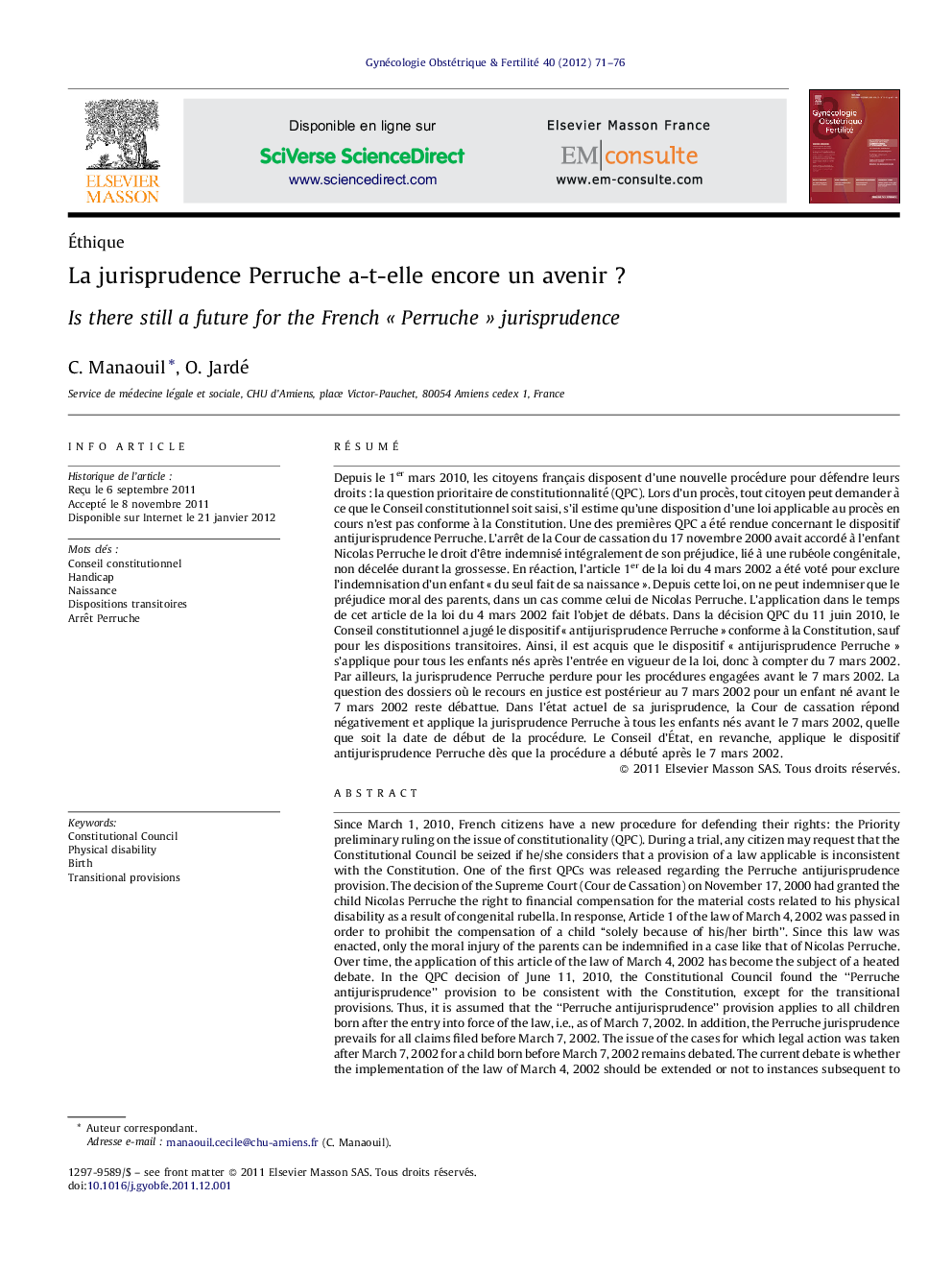| کد مقاله | کد نشریه | سال انتشار | مقاله انگلیسی | نسخه تمام متن |
|---|---|---|---|---|
| 3949221 | 1254693 | 2012 | 6 صفحه PDF | دانلود رایگان |

RésuméDepuis le 1er mars 2010, les citoyens français disposent d’une nouvelle procédure pour défendre leurs droits : la question prioritaire de constitutionnalité (QPC). Lors d’un procès, tout citoyen peut demander à ce que le Conseil constitutionnel soit saisi, s’il estime qu’une disposition d’une loi applicable au procès en cours n’est pas conforme à la Constitution. Une des premières QPC a été rendue concernant le dispositif antijurisprudence Perruche. L’arrêt de la Cour de cassation du 17 novembre 2000 avait accordé à l’enfant Nicolas Perruche le droit d’être indemnisé intégralement de son préjudice, lié à une rubéole congénitale, non décelée durant la grossesse. En réaction, l’article 1er de la loi du 4 mars 2002 a été voté pour exclure l’indemnisation d’un enfant « du seul fait de sa naissance ». Depuis cette loi, on ne peut indemniser que le préjudice moral des parents, dans un cas comme celui de Nicolas Perruche. L’application dans le temps de cet article de la loi du 4 mars 2002 fait l’objet de débats. Dans la décision QPC du 11 juin 2010, le Conseil constitutionnel a jugé le dispositif « antijurisprudence Perruche » conforme à la Constitution, sauf pour les dispositions transitoires. Ainsi, il est acquis que le dispositif « antijurisprudence Perruche » s’applique pour tous les enfants nés après l’entrée en vigueur de la loi, donc à compter du 7 mars 2002. Par ailleurs, la jurisprudence Perruche perdure pour les procédures engagées avant le 7 mars 2002. La question des dossiers où le recours en justice est postérieur au 7 mars 2002 pour un enfant né avant le 7 mars 2002 reste débattue. Dans l’état actuel de sa jurisprudence, la Cour de cassation répond négativement et applique la jurisprudence Perruche à tous les enfants nés avant le 7 mars 2002, quelle que soit la date de début de la procédure. Le Conseil d’État, en revanche, applique le dispositif antijurisprudence Perruche dès que la procédure a débuté après le 7 mars 2002.
Since March 1, 2010, French citizens have a new procedure for defending their rights: the Priority preliminary ruling on the issue of constitutionality (QPC). During a trial, any citizen may request that the Constitutional Council be seized if he/she considers that a provision of a law applicable is inconsistent with the Constitution. One of the first QPCs was released regarding the Perruche antijurisprudence provision. The decision of the Supreme Court (Cour de Cassation) on November 17, 2000 had granted the child Nicolas Perruche the right to financial compensation for the material costs related to his physical disability as a result of congenital rubella. In response, Article 1 of the law of March 4, 2002 was passed in order to prohibit the compensation of a child “solely because of his/her birth”. Since this law was enacted, only the moral injury of the parents can be indemnified in a case like that of Nicolas Perruche. Over time, the application of this article of the law of March 4, 2002 has become the subject of a heated debate. In the QPC decision of June 11, 2010, the Constitutional Council found the “Perruche antijurisprudence” provision to be consistent with the Constitution, except for the transitional provisions. Thus, it is assumed that the “Perruche antijurisprudence” provision applies to all children born after the entry into force of the law, i.e., as of March 7, 2002. In addition, the Perruche jurisprudence prevails for all claims filed before March 7, 2002. The issue of the cases for which legal action was taken after March 7, 2002 for a child born before March 7, 2002 remains debated. The current debate is whether the implementation of the law of March 4, 2002 should be extended or not to instances subsequent to March 7, 2002 for births prior to that date. In the present state of jurisprudence, the Court of Appeals answers negatively and applies the Perruche jurisprudence to all children born before March 7, 2002, regardless of the date by which the claims were filed.
Journal: Gynécologie Obstétrique & Fertilité - Volume 40, Issue 2, February 2012, Pages 71–76